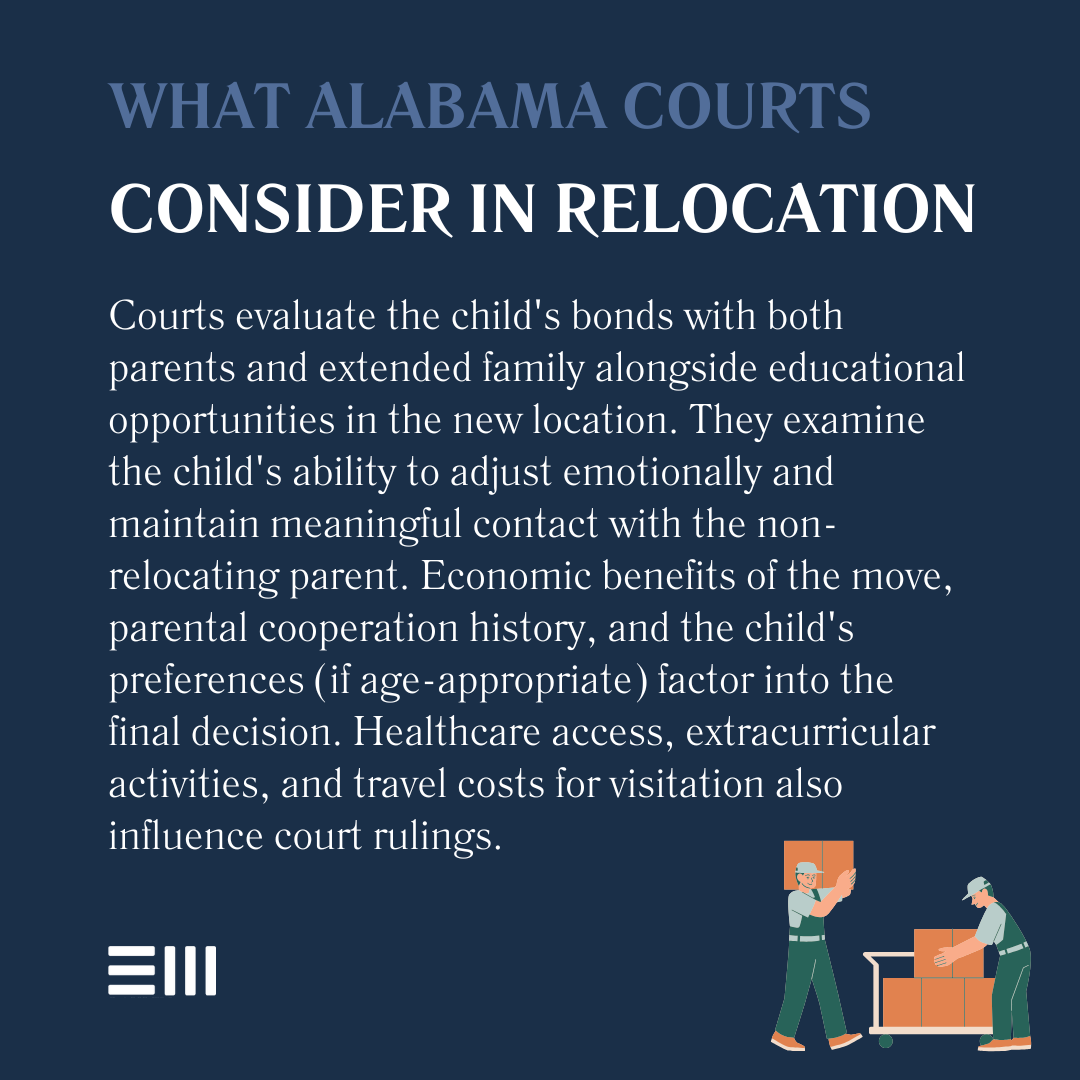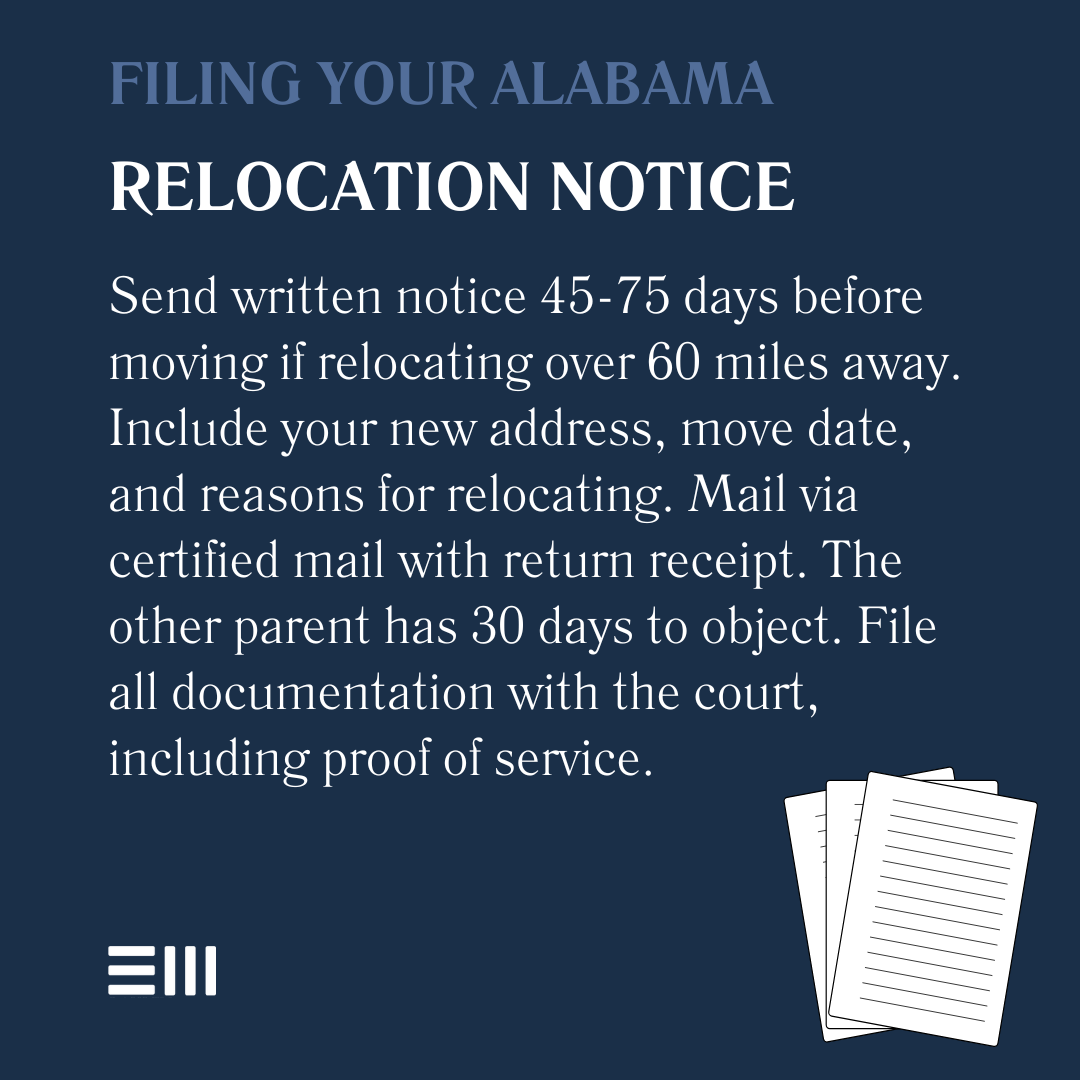Many Alabama parents discover that moving across state lines involves much more than boxing up memories—it requires careful navigation of the state's custody laws.
Whether prompted by a career opportunity, family obligations, or personal circumstances, relocating with children after divorce or separation presents complex legal challenges that can impact both parents and children for years to come.
When contemplating an out-of-state move, Alabama parents must understand that the state's courts prioritize the best interests of the child above all else. This means that even if you have primary physical custody, you cannot simply pack up and leave without following proper legal procedures.
The decision to relocate can affect visitation schedules, educational continuity, and most importantly, the child's relationship with both parents.
Understanding Alabama's Parent Relocation Act
The Alabama Parent-Child Relationship Protection Act establishes strict guidelines for parents wanting to relocate with their children.
Before diving into specific requirements, it's important to note that these laws apply whether you have primary custody, joint custody, or visitation rights.
The Act represents one of the most comprehensive relocation laws in the Southeast, designed to protect children's relationships with both parents.
- Must provide written notice 45-75 days before moving;
- Notice required for moves of 60+ miles from other parent;
- Detailed information about new residence required;
- Proposed revised custody/visitation schedule needed;
- Other parent has 30 days to object;
- Criminal penalty possible for willful violations;
- Must include information about new schools and community;
- Required to provide updated contact information;
- Notice must outline reasons for the proposed move; and
- Documentation of new employment if job-related.
These requirements ensure transparency and protect both parents' rights to maintain meaningful relationships with their children.
What the Courts Consider in Relocation Cases
Alabama courts carefully weigh multiple factors when evaluating relocation requests. Understanding these elements helps parents prepare stronger cases and make informed decisions about their moves.
The following primary factors carry the most weight in court decisions:
- Child's relationship with both parents;
- Age and developmental needs of the child;
- Impact on extended family relationships;
- Educational opportunities in new location;
- Child's emotional adjustment capability;
- Economic benefits for relocating parent;
- Ability to maintain meaningful contact with non-relocating parent;
- Child's preference (if age-appropriate); and
- History of cooperation between parents.
These core factors serve as the foundation for most relocation decisions and require substantial documentation to support your case.
Secondary Factors
While less critical than primary considerations, these additional factors can significantly influence the court's final decision:
- Quality of life improvements;
- Healthcare access in new location;
- Extracurricular opportunities;
- Cultural and community resources;
- Cost of living differences;
- Support system availability;
- Travel costs for visitation;
- Impact on child's established routines;
- Technology access for virtual visits; and
- Safety considerations.
Courts prioritize decisions that serve the child's best interests while balancing both parents' rights to maintain strong relationships with their children.
Steps for Filing a Relocation Notice
A successful relocation process begins with proper documentation and timing.
Following these steps helps ensure compliance with Alabama law and increases the likelihood of court approval.
Initial Documentation Requirements
Before beginning the formal filing process, gather these essential documents and information:
Draft written notice including:
- New address and phone number;
- Relocation date;
- Reasons for move;
- Proposed visitation schedule;
- School district information;
- Employment details if applicable;
- Housing arrangements;
- Community resources;
- Travel time calculations; and
- Cost analysis for visitation.
Serve notice to other parent:
- Keep copies of all documentation;
- Document date of service;
- Include return envelope for response; and
- Maintain delivery confirmation.
Wait for response period:
- 30 days for other parent to object;
- If objection filed, prepare for hearing;
- If no objection, proceed with move;
- Document all communication; and
- Consider mediation options.
File with court:
- Submit notice copy to court;
- Include proof of service;
- Request hearing if needed;
- Provide updated information; and
- Include supporting evidence.
Following these procedures demonstrates good faith and responsibility to the court, strengthening your position in any potential disputes.
Questions About Relocating With Children in Alabama
Understanding Alabama's relocation laws can feel overwhelming.
Here are answers to common questions that parents frequently ask when considering a move.
How Far Can I Move Without Court Permission?
Moves less than 60 miles from the other parent typically don't require formal notice.
However, any relocation affecting the current custody schedule needs discussion with the other parent. Courts recommend documenting even short-distance moves to prevent future disputes.
What if the Other Parent Won't Respond to My Notice?
After proper service and 30 days without response, you may proceed with the move.
Document all attempts at communication and keep copies for court records. Courts view non-responding parents less favorably in subsequent custody disputes.
Can My Child's Preference Affect the Court's Decision?
Courts consider children's preferences based on age and maturity. Courts carefully evaluate whether these preferences reflect genuine choice rather than parental influence.
What if I Need to Move Quickly for a Job?
Emergency moves require immediate court notification. While courts understand job-related urgency, following proper procedures remains crucial for maintaining custody rights. Consider requesting expedited hearings for time-sensitive relocations.
How Does Relocation Impact Child Support?
Distance-based changes in visitation often warrant child support modifications. Courts recalculate based on new travel costs and changed parenting time schedules.
Take the Next Step in Your Relocation Journey
Your children's future deserves careful planning and expert guidance.
Our experienced family law attorneys understand Alabama's relocation requirements and can help protect your rights while ensuring smooth transitions for your family.
Contact Baxley Maniscalco today for a confidential consultation about your relocation plans. We'll help you navigate Alabama's custody laws and develop a strategy that serves your family's best interests.


